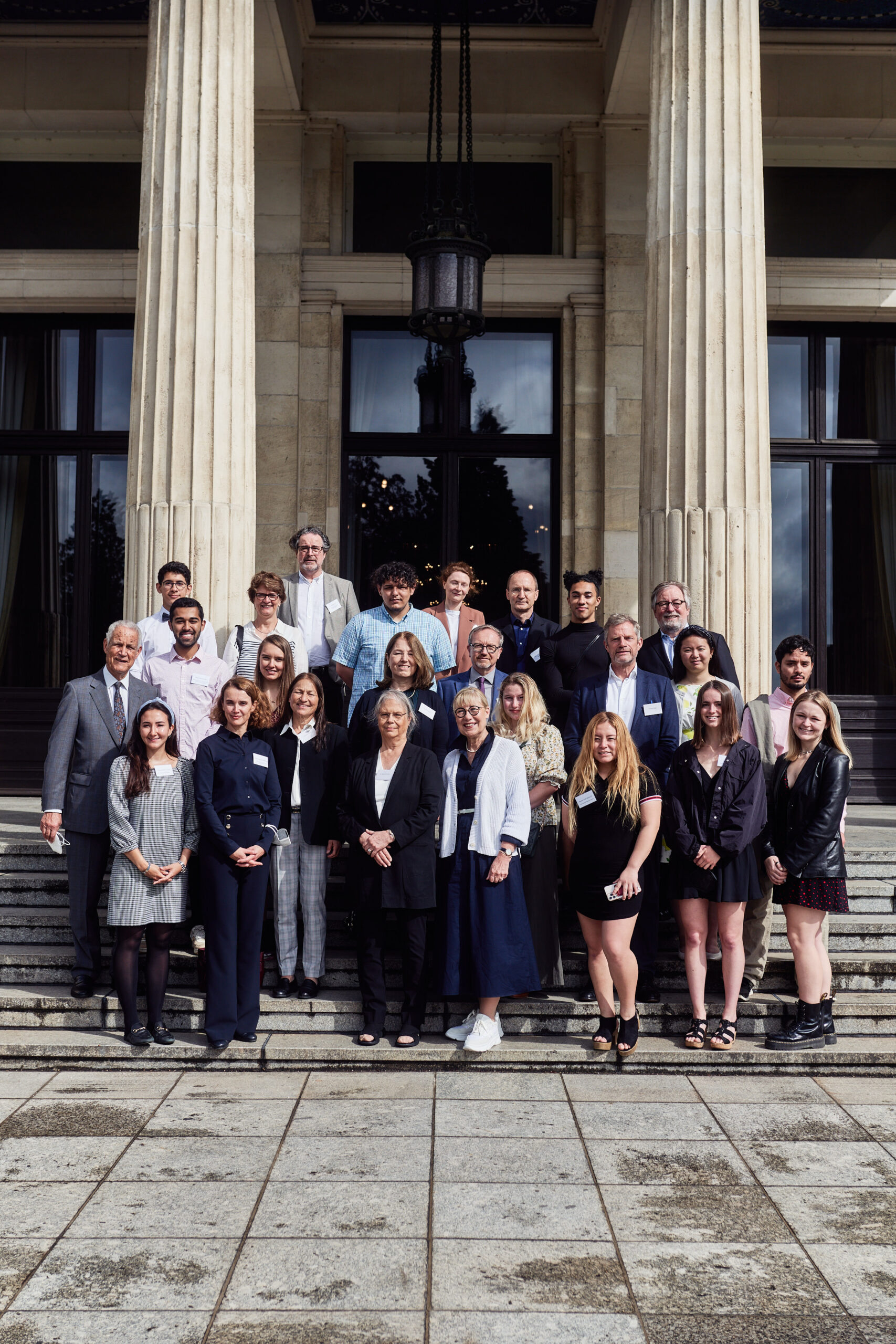George Will, a native Berliner who studied at Stanford in the early 1950s and later returned to Berlin as CEO of the pharmaceutical company Henning, has supported Stanford in Berlin since the mid-1970s, when the University decided to move its German campus, which had been established in 1958 in Beutelsbach/Baden Württemberg, to West Berlin. George Will’s support was untiring — from helping to locate student housing to seeking a study center location close to the Freie Universität to endowing enrichment activities, and enabling, in the year 2000, the purchase of Haus Cramer. The purchase, endorsed by many official partners, including the Senator for Science, Research & Culture, the Freie Universität Berlin, and the Berlin Parliament, enjoyed supplemental funding through Stanford University President Prof. Gerhard Casper. The purchase was facilitated through the efforts of then Director of Stanford Overseas Studies Prof. Russell Berman, Director of Stanford in Berlin Dr. Karen Kramer, and the Stanford Club of Germany. In 2019, honoring George Will’s decades of support, the home of Stanford in Berlin was officially renamed the H.G. Will Center.
On the occasion of the 50th anniversary of George’s graduation from Stanford, he established, with matching funds by the Hewlett Foundation, the H.G. Will Fund, which supports a broad range of activities at Stanford in Berlin, most significantly the „H.G. Will Field Trips on European Expansion.” Over 50 cohorts of Stanford students have explored and learned about a new EU member/candidate country on these „Will Trips.“
The “Will Cube” in the foyer of the Center lists George Will’s major contributions to Stanford in Berlin. Through the WILL FOUNDATION George Will has facilitated, among other things, a research collaboration between Stanford and the Berlin Charité, the Deutsches Herzzentrum, and, in partnership with the Freie Universität, brought Nobel Prize holder Prof. Thomas Südhof to Berlin for a major keynote address and a week of networking with life science specialists.
The university enjoys a long and productive partnership with the Krupp Foundation / Alfried Krupp von Bohlen und Halbach-Stiftung.
The Krupp Internship Program for Stanford Students in Germany was established in 1982 through the foresight and generosity of the Krupp Foundation under the leadership of Prof. Dr. h.c. mult. Berthold Beitz in a conversation with Stanford Club of Germany Board member Claus Zoellner and Stanford Special Assistant to the President Kenneth Kaufman. The program was modelled on a successful pilot project hosted the previous year by the German Academic Exchange Service (DAAD) to bring Stanford engineering and natural science undergraduates to Germany. The Krupp Internship Program was soon to be expanded to include students of humanities and social sciences.
The internship program provides deep linguistic and cultural immersion at a high professional level through workplace collaboration in students’ areas of specialization, thereby furthering transatlantic understanding through shared human interaction. This exceptional program has to date placed over 1350 Stanford students in full-time internships of 3 to 6 months with nearly 600 German host institutions.
On the occasion of the 40th anniversary of the Krupp Internship Program, an impact survey was conducted with the alumni who completed full-time internships in German workplaces subsequent to studying at Stanford in Berlin. The data and shared insights of the respondents of four decades testifies to the profound and enduring effect of Krupp Internship experiences on the lives of its alumni.
For more information about the program go to Krupp Internship Program for Stanford Students in Germany and Briefe aus Berlin
History of the Krupp Foundation
The Foundation was established through the testament of Alfried Krupp von Bohlen und Halbach. Shortly before the end of the Second World War, on April 11, 1945, Alfried Krupp von Bohlen und Halbach was arrested by American troops and in 1947 was found guilty at Nuremberg of using concentration camp labor and of plundering occupied countries. He was sentenced to twelve years imprisonment and the confiscation of his property. In 1951, in the course of a general review of Nuremberg judgments, John Jay McCloy, the US High Commissioner for Germany, pardoned him and lifted the confiscation of his property. In 1953 he returned to the helm of his company and, later that year, appointed as his personal general representative Berthold Beitz (1913–2013); Beitz converted the company to civilian production. Alfried Krupp’s testament transferred his entire personal assets and the assets of the Krupp AG to the philanthropic foundation that bears his name.
As Chair of the Kuratorium from 1968 until his death in 2013, Beitz developed the Foundation as a major source of funding for scientific research, art & culture, education, health and sports. Beitz and his wife Else are honored at Yad Vashem as Righteous Among the Nations for having saved hundreds of Jewish forced laborers from transports to the death camps by employing them in an essential war industry (oil) in Boryslav/Poland. Beitz personally initiated the “Krupp Internship Program for Stanford Students in Germany.”
Obituary Berthold Beitz
Press Release from the Krupp Foundation, July 2013
The Krupp Intern: Letter to Berthold Beitz
In commemoration of three decades of the Krupp Internship Program, alumni were invited to reflect on their experiences in Germany. Karen Kramer excerpted words and passages from these testimonials, melding them into a composite account, The Krupp Intern. President emeritus Gerhard Casper presented the account as a designer art-book to Prof. Dr. Berthold Beitz at the 30th anniversary celebration of the Program at Villa Hügel on May 10, 2012. Words printed against colored background are verbatim passages from alumni testimonials, the internship year is flagged in the margin.
The Krupp Intern (download pdf)
Fellowship for Visiting Student Researchers at Stanford
Another inititiave established by the Krupp Foundation is an annual fellowship program for doctoral students from German universities to pursue research for their thesis at Stanford University in California. In 2020 the first cohort of three doctoral fellows in the humanities joined the Stanford scholarly community. While Covid prevented their completing their full tenure, their months on campus proved the new program to be exceptionally productive, both for the doctoral students and for the departments that hosted them. The program resumed in 2022 and is continuing to date.
Visit the Krupp Foundation website for more information about this Fellowship Program.
The Stanford Alumni Club of Germany, e.V. (later Stanford Club of Germany, e.V. = SCoG) was founded in 1980. The SCoG soon endorsed Stanford in Berlin as flagship program for German development activities. Successful projects funded through the SCoG include
- the Visiting German Chair at Stanford (enabled by 10-years’ funding through the Auswärtiges Amt and the Volkswagen-Stiftung, ca. 1980-1990);
- liaising with the Stiftung Deutsche Klassenlotterie Berlin for major restoration and modernization projects on Haus Cramer (Stanford’s H.G. Will Center, Berlin);
- facilitating the purchase of Haus Cramer for Stanford University with donations of H.G. Will and through Stanford President Gerhard Casper;
- the Krupp Internship Program for Stanford Students in Germany (1982 – present);
- the Stanford Symposia on Transition in Europe at Stanford in Berlin (1991-1996);
- Stanford-Siemens Student Workshops on Globalization (early 2000s, in Berlin and Beijing);
- establishment of the SCoG Endowment for Stanford in Berlin, enabled through the support of German partners, which provides supplemental funding for the Krupp Internship Program and funds the “SCoG Visiting Lectureship in German Studies”;
- liaising to the Gerda Henkel Guest Professorship in the Historical Humanities (since 2009);
- endowment of the Graduate Research and Internship Program in Germany (GRIP/ since 2017);
- sponsoring of prizes for superlative student essays and language learning in the German Studies Program at Stanford.
For more information about the SCoG visit their website at: https://www.stanfordclubofgermany.de





